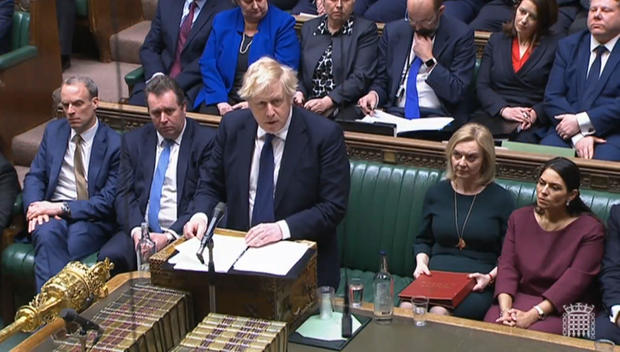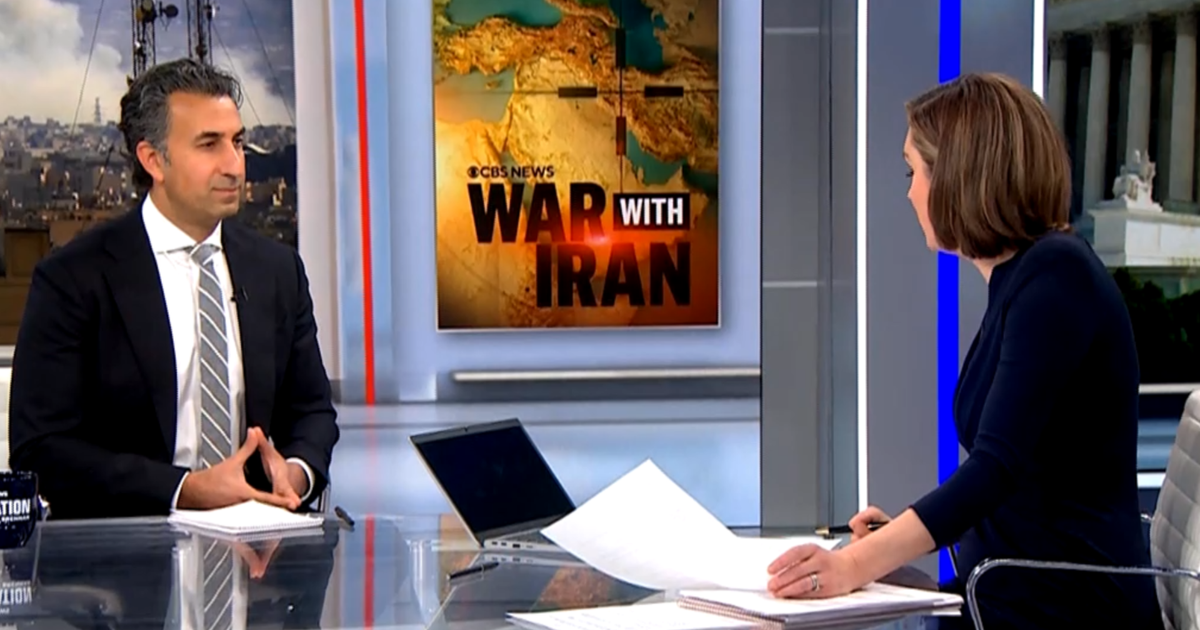What to know about new U.S. sanctions targeting Russia for attacking Ukraine
Washington — President Biden announced a slew of new sanctions taking aim at Russia's financial and technological sectors on Thursday in retaliation for the Kremlin's attack on Ukraine, vowing to cut off Russia's access to high-tech imports and freezing more than $1 trillion in Russian assets held overseas.
"Putin is the aggressor. Putin chose this war," Mr. Biden said from the White House. "And now he and his country will bear the consequences."
For weeks, the president has warned that the U.S. was ready to impose "swift and severe" economic penalties against Russia if it invaded Ukraine. He said the sanctions announced Thursday are being imposed in conjunction with allies who, along with the U.S., account for "well more than half the global economy."
The White House and European allies announced limited economic measures earlier this week intended to deter Putin from further aggression after he recognized as independent the Donetsk and Luhansk regions of eastern Ukraine. But the initial sanctions did little to stop the Kremlin from escalating the crisis with Ukraine, as Russian forces began shelling Ukrainian cities, including the capital, Kyiv, late Wednesday.
New sanctions take aim at Russian banks, imports and elites close to Putin
The latest round of sanctions from the U.S. targets more Russian banks and oligarchs with the intention of cutting them off from the U.S. financial system and, with the penalties from Western allies, the broader global economy.
"We will limit Russia's ability to do business in dollars, euros, pounds and yen to be part of the global economy, we're going to limit their ability to do that," the president said. "We're going to stunt the ability to finance and grow the Russian military, and we're going to impair their ability to compete in the high-tech 21st century economy."
The U.S. will freeze assets from four major Russian banks, including state-owned VTB. With the latest action targeting the financial institutions, the Biden administration has so far targeted Russian banks that together hold $1 trillion in assets. Sanctioning VTB, the Treasury Department said, "will sever a critical artery of Russia's financial system," and its U.S.-held assets "will be instantly frozen and inaccessible to the Kremlin."
The Biden administration is also sanctioning Sberbank, Russia's largest financial institution and the main creditor of the Russian economy.
More Russian oligarchs and members of their families will also be hit with sanctions, with additional elites expected to be targeted in the future. The members of Putin's inner circle sanctioned are: Sergei B. Ivanov and his son Sergei S. Ivanov; Nikolai Patrushev and his son Andrey Patrushev; and Igor Sechin and his son Ivan Sechin.
Sergei B. Ivanov is the special presidential representative for environmental protection, ecology and transport, and is considered one of Putin's closest allies. Nikolai Patrushev is secretary of the Russian Federation Security Council. Igor Sechin is head of Rosneft, a publicly traded oil company.
Senior executives at state-owned banks were also hit with economic penalties: Alexander Aleksandrovich Vedyakhin of Sberbank; Andrey Sergeyevich Puchkov and Yuriy Alekseyevich Soloviev of VTB; and Soloviev's wife, Galina Olegovna Ulyutina.
"We will keep up this drumbeat of those designations against corrupt billionaires in the days ahead," Mr. Biden said.
In addition to hitting Russian elites and banks, the U.S. is sanctioning 24 Belarusian individuals and entities in response to its support of Russia's invasion.
The president said the impacts of the sanctions from the U.S. and Europe will be felt "over time," but the actions announced so far will cut off more than half of Russia's high-tech imports, harm its ability to modernize its military, degrade Russia's aerospace industry and hit Putin's "long-term strategic ambitions."
The Commerce Department said the U.S. is banning exports of "semiconductors, computers, telecommunications, information security equipment, lasers, and sensors" to Russia, targeting its "defense, aerospace, and maritime industries."
"We have purposefully designed these sanctions to maximize a long-term impact on Russia and to minimize the impact on the United States and our allies," Mr. Biden said.
The new sanctions from the Biden administration do not cut off Russia's access to SWIFT, the system that facilitates global financial transactions. The president said doing so is "always an option," but he cited opposition from Europe on why it was excluded from this round of measures.
Mr. Biden said sanctioning Putin himself also remains on the table.
How Europe is responding to Russia's offensive
The European Union planned to present "a package of massive and targeted sanctions" to member countries for their approval Thursday, according to Ursula von der Leyen, the president of the European Commission.
"With this package, we will target strategic sectors of the Russian economy by blocking their access to technologies and markets that are key for Russia. We will weaken Russia's economic base and its capacity to modernise," von der Leyen said in a statement before Mr. Biden's address. "And in addition, we will freeze Russian assets in the European Union and stop the access of Russian banks to European financial markets."
The EU leader said the sanctions package is "designed to take a heavy toll on the Kremlin's interests and their ability to finance war" and was being developed in consultation with the U.S., U.K., Canada, Japan, Australia and other partners.
Prime Minister Boris Johnson also vowed to impose a "massive package of economic sanctions designed in time to hobble the Russian economy" in a televised address on Thursday. The U.K. hit five Russian banks and three oligarchs with sanctions earlier in the week.
As part of its new tranche of sanctions, which Johnson called the "largest and most severe package of economic sanctions that Russia has ever seen," the U.K. will freeze the assets of major Russian banks, including VTB, as well as 100 new entities and individuals. The U.K. will also limit the amount of money Russian nationals can deposit into their U.K. bank accounts, he said.
The U.K. is banning Aeroflot, Russia's largest airline, as part of its response and imposing new sanctions on Belarus for its role in Russia's assault on Ukraine.
Alongside the U.S. and European Union, Johnson told the House of Commons he will also take steps to impose new trade restrictions and export controls, with plans to bring forward legislation to ban a range of high-tech exports to Russia.
"These trade sanctions will constrain Russia's military-industrial and technological capabilities for years to come," he said.
When Putin recognized the independence of breakaway regions of Donetsk and Luhansk, Germany took steps to halt the certification of the Nord Stream 2 pipeline, a significant setback for Russia's aspirations to exert more leverage over European energy markets.
Owned by Gazprom, Russia's state-backed energy company, the non-operational pipeline is a multi-billion dollar project designed to double the amount of gas carried from Russia to Germany.
The U.S. has been opposed to Germany using the pipeline, warning it would boost the country's dependence on Russia for natural gas. Mr. Biden said the U.S. was working with Germany to ensure Nord Stream 2 "will not move forward," and issued sanctions against the company behind the pipeline on Wednesday.
Before Thursday's offensive, EU foreign ministers agreed to an initial package of sanctions in response to Moscow's recognition of the two breakaway republics in eastern Ukraine, which targeted individuals and banks, as well as the ability of the Russian state and government to access the EU's capital and financial markets.
The sanctions specifically hit 27 Russian individuals and entities covering the political, military, business and media sectors, as well as 351 members of Russia's parliament who voted to recognize the Luhansk and Donetsk regions as independent.




